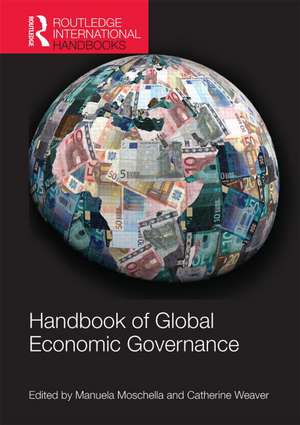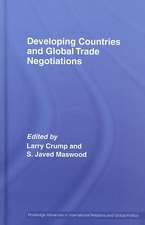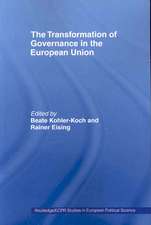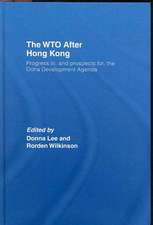Handbook of Global Economic Governance: Players, Power and Paradigms: Routledge International Handbooks
Editat de Manuela Moschella, Catherine Weaveren Limba Engleză Hardback – 13 dec 2013
This book tackles the issue of what the governance of the global economic and financial system looks like and what the prospects for its reform are. Specifically, the book will address the following three main themes:
Governance: What is governance in the international economic system? What forms
does it take? How did it come about? How can we study it?;
Functions of governance: What are the functions of global economic governance? Who
performs them? What are the rules and mechanisms that make global governance
possible?
Problems and prospects of governance: What are the problems in global economic governance? Is there a trade-off between legitimacy and efficiency? What are the prospects for reform of global economic governance in the aftermath of the global financial crisis?
This book will:
- Provide a thorough analysis of the issues at stake in designing international rules and institutions able to govern the global economy;
- illustrate and analyze virtually all the main institutions, rules, and arrangements that make up global economic governance, inscribing them within the function these institutions, rules, and arrangements are meant to perform;
- discuss the problems that affect today’s global economic governance and assess alternative proposals to reform the international financial architecture.
Din seria Routledge International Handbooks
-
 Preț: 371.78 lei
Preț: 371.78 lei -
 Preț: 375.50 lei
Preț: 375.50 lei -
 Preț: 362.19 lei
Preț: 362.19 lei -
 Preț: 352.08 lei
Preț: 352.08 lei - 9%
 Preț: 1487.70 lei
Preț: 1487.70 lei - 5%
 Preț: 317.31 lei
Preț: 317.31 lei -
 Preț: 372.05 lei
Preț: 372.05 lei -
 Preț: 361.19 lei
Preț: 361.19 lei -
 Preț: 390.13 lei
Preț: 390.13 lei -
 Preț: 311.91 lei
Preț: 311.91 lei - 9%
 Preț: 1489.40 lei
Preț: 1489.40 lei -
 Preț: 390.22 lei
Preț: 390.22 lei -
 Preț: 347.74 lei
Preț: 347.74 lei -
 Preț: 347.74 lei
Preț: 347.74 lei - 9%
 Preț: 1490.11 lei
Preț: 1490.11 lei -
 Preț: 356.22 lei
Preț: 356.22 lei -
 Preț: 348.27 lei
Preț: 348.27 lei - 5%
 Preț: 328.11 lei
Preț: 328.11 lei -
 Preț: 394.24 lei
Preț: 394.24 lei - 8%
 Preț: 392.89 lei
Preț: 392.89 lei - 8%
 Preț: 422.42 lei
Preț: 422.42 lei -
 Preț: 357.22 lei
Preț: 357.22 lei - 8%
 Preț: 421.97 lei
Preț: 421.97 lei - 5%
 Preț: 437.80 lei
Preț: 437.80 lei -
 Preț: 341.55 lei
Preț: 341.55 lei - 9%
 Preț: 1651.61 lei
Preț: 1651.61 lei - 9%
 Preț: 1665.66 lei
Preț: 1665.66 lei -
 Preț: 381.91 lei
Preț: 381.91 lei -
 Preț: 350.20 lei
Preț: 350.20 lei -
 Preț: 347.74 lei
Preț: 347.74 lei - 20%
 Preț: 1400.22 lei
Preț: 1400.22 lei -
 Preț: 342.76 lei
Preț: 342.76 lei -
 Preț: 348.17 lei
Preț: 348.17 lei -
 Preț: 345.16 lei
Preț: 345.16 lei -
 Preț: 353.88 lei
Preț: 353.88 lei -
 Preț: 1057.72 lei
Preț: 1057.72 lei -
 Preț: 348.05 lei
Preț: 348.05 lei - 5%
 Preț: 330.12 lei
Preț: 330.12 lei -
 Preț: 358.30 lei
Preț: 358.30 lei - 9%
 Preț: 1528.86 lei
Preț: 1528.86 lei -
 Preț: 346.77 lei
Preț: 346.77 lei -
 Preț: 392.48 lei
Preț: 392.48 lei - 9%
 Preț: 1454.51 lei
Preț: 1454.51 lei - 5%
 Preț: 326.85 lei
Preț: 326.85 lei -
 Preț: 346.11 lei
Preț: 346.11 lei -
 Preț: 361.74 lei
Preț: 361.74 lei - 9%
 Preț: 1349.74 lei
Preț: 1349.74 lei - 19%
 Preț: 422.81 lei
Preț: 422.81 lei - 8%
 Preț: 385.56 lei
Preț: 385.56 lei
Preț: 1189.69 lei
Preț vechi: 1894.03 lei
-37% Nou
Puncte Express: 1785
Preț estimativ în valută:
227.67€ • 236.35$ • 189.84£
227.67€ • 236.35$ • 189.84£
Carte tipărită la comandă
Livrare economică 25 martie-08 aprilie
Preluare comenzi: 021 569.72.76
Specificații
ISBN-13: 9781857436358
ISBN-10: 1857436350
Pagini: 416
Dimensiuni: 174 x 246 x 33 mm
Greutate: 0.9 kg
Ediția:New.
Editura: Taylor & Francis
Colecția Routledge
Seria Routledge International Handbooks
Locul publicării:Oxford, United Kingdom
ISBN-10: 1857436350
Pagini: 416
Dimensiuni: 174 x 246 x 33 mm
Greutate: 0.9 kg
Ediția:New.
Editura: Taylor & Francis
Colecția Routledge
Seria Routledge International Handbooks
Locul publicării:Oxford, United Kingdom
Cuprins
Section 1: Introduction 1. Global Economic Governance: Players, Power and Paradigms Manuela Moschella and Catherine Weaver Section 2: Governing Global Trade 2. Plus ça change? Business as usual in the Governance of Global Trade Rorden Wilkinson 3. Does sunshine make a difference? How transparency brings the trading system to life Robert Wolfe 4. Adaptation and Change in EU Trade Governance: The EU's Paradigm Shift from Multilateralism to Regionalism and Bilateralism Eugenia da Conceição-Heldt 5. Global Economic Governance: Intellectual Property Susan K. Sell 6. Governing Trade in Global Food and Agriculture Jennifer Clapp and Kim Burnett Section 3: Global Governance of Finance and Money 7. The Historical Origins and Development of Global Financial Governance Randall Germain 8. The G20 and Global Financial Regulation Lora Viola 9. The Role of Private Governance in Global Finance Tony Porter and Heather McKeen-Edwards 10. The Financial Stability Board Stefano Pagliari 11. The International Monetary Fund's Evolving Role in Global Economic Governance Steve Nelson 12. Governing Capital Flows Kevin Gallagher 13. The Governance of Black Holes of the World Economy: Shadow Banking and Offshore Finance Ronen Palan and Anastasia Nesvetailova 14. The Eurozone Crisis: Growing Pains or Doomed from the Start? Matthias Matthijis 15. The Future of the Dollar? Minh Ly Section 4: Governing Development 16. The History of International Development Aid David Williams 17. The World Bank in the Post-Structural Adjustment Era Matthew S. Winters and Shyam Kulkami 18. The UN and Global Development Stephen Browne 19. Global Economic Governance and the Regional Development Banks Jonathan Strand 20. Non-DAC Donors and the Changing Landscape of Bilateral Aid Mike Findley and Katherine Kitterman 21. Private Transnational Governance of Economic Development: International Development Aid Tim Buthe and Cindy Cheng Section 5: Crisis and Change in Global Economic Governance Today 22. The contradictions of post-crisis global economic governance Dan Drezner
Notă biografică
Manuela Moschella is Lecturer in Political Science at the University of Turin, Italy. Previously, she was ‘Nino Andreatta Fellow’ at the University of Bologna, Italy and Visiting Fellow at Johns Hopkins University, USA and at Copenhagen Business School, Denmark. She is the author of Governing Risk: The IMF and Global Financial Crises (Palgrave Macmillan, 2010) and one of the editors of Great Expectations, Slow Transformations: Incremental Change in Post-crisis Regulation (ECPR Press, 2013). Her core research interests include the politics of financial regulatory reforms and processes of change in global economic governance. She has published on these issues in a number of journals, including the Review of International Political Economy, New Political Economy, the Journal of Public Policy, and Comparative European Politics. Catherine Weaver is Associate Professor at the LBJ School of Public Affairs at the University of Texas at Austin, USA, where she directs the MA programme in Global Policy Studies and co-directs the research programme on Innovations for Peace and Development. She conducts extensive research on the organizational behaviour and reform of international financial institutions, the political economy of global development aid and the use of GIS (geographic information system) technology to track and map international development and climate adaptation aid world-wide. In addition to numerous journal articles and book chapters, she is the author of Hypocrisy Trap: The World Bank and the Poverty of Reform (Princeton University Press, 2008) and co-editor (with Nicola Phillips) of International Political Economy: Debating the Past, Present and Future (Routledge Press, 2010).
Descriere
This book, in the Routledge International Handbooks series, examines the issue of governance of the global economic and financial system and prospects for its reform. Specifically, the book will address the following three main themes: Governance; Functions of governance; and Problems and prospects of governance. The handbook will provide a thorough analysis of the issues at stake in designing international rules and institutions able to govern the global economy; illustrate and analyse virtually all the main institutions, rules and arrangements that make up global economic governance, inscribing them within the function these institutions, rules and arrangements are meant to perform; discuss the problems that affect today’s global economic governance and assess alternative proposals to reform the international financial architecture.

























